The artistic prowess, power and grace of figure skating makes it a beautiful thing to watch, but can leave you asking ‘Is figure skating a sport or an art?
Figure skating is definitely a sport. Figure skating requires high levels of athleticism, years of training. The judging system is partially quantitative and partially subjective. It is the subjective part of the judging system that causes some to ask ‘is figure skating a sport?’ The answer is yes. Figure skating is an Olympic sport, here is why.
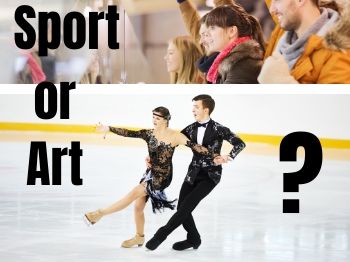
Figure skating is a sport that requires such a level of skill it is mastered with artistry. There is also an artistic element to the sport that makes it stand out among sports, but does not stop it being a sport.
The definition of a sport – Dictionary definition
So here is the dictionary definition of what a sport is – an activity involving physical exertion and skill in which an individual or team competes against another or others for entertainment.
Well figure skating seems to fit that definition.
The definition of an art form – Dictionary definition
So here is the dictionary definition of an art form – a conventionally established form of artistic composition, such as the novel, sonata, or sonnet.
Or
Any activity regarded as a medium of imaginative or creative self-expression.
So they both fit figure skating as well. You can see the source of confusion. Figure skating is a sport with an artistic element.
Is figure skating a sport? – The Olympic council seem to think so

Since 1924 figure skating has been an event in the winter Olympics. For me the Olympics is the personification of sport. The very nature of the Olympics is all that is the best in sport. The bringing together of nations in friendly competition. The highest level of athletic achievement and the highest personal achievement of any athlete.
Sports are not entered into the Olympics on a whim. The fact that figure skating has been in the winter Olympics for nearly 100 years speaks volumes for the sport.
Scoring – figure skating as a sport
The scoring of figuring skating is both quantifiable and subjective. The quantifiable part, where levels of difficulty are examined and the levels of achievement are judged along side are quite predictable. This sits well with people that like hard rules by which they judge if an activity is a sport or not.
The subjective part of the scoring, is the interpretation of how well it was done, as a whole artistic piece. This doesn’t sit well with those who need hard and fast rules to call something a sport. Some people need to know how may goals were scored, how high was the jump or what time was something completed in.
Scoring by judges

The fact that an event has to be judged, causes for some people, a reason to doubt whether an activity is a sport. This is because some mindsets believe, that a judged event is there to impress the judges, rather than compete against other individuals.
This in my opinion is a nonsense, because the judges scores are directly pitted against your rivals. That is how you walk away with gold or with nothing.
There is a group of people that believe that judged sports are not a sport. They believe that if you can count how many times a hockey puck enters a goal, then that is quantifiable, but if you rely on a judge, a human judge, there is an element of subjectivity. Some believe that as soon as there is an element of subjectivity there is room for error, bias or corruption.
What if all the judged sports were removed.
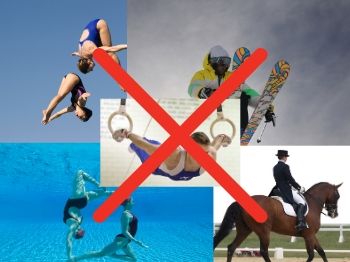
With sports like figure skating, then new points allocation system makes the awarding of points so much fairer and more accurate than before. Plus many of the points are awarded objectively, only some are subjectively awarded.
If you were to remove judged sports from the Olympics, you would be loosing diving, dressage, freestyle skiing, snowboarding, gymnastics, ski jumping, synchronized swimming and more. As soon as there is any artistic or free style element, you would have to boot a sport from the Olympics. That is not a way to look at sport.
How figure skating is scored as a sport and as an art
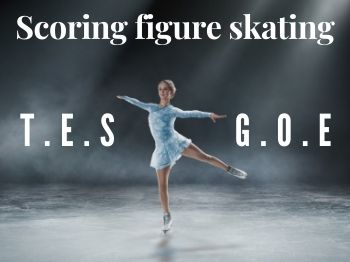
Figure skating is scored in two ways, at an objective level, the Technical Element Score (TES) this is calculated from the Grade of Execution (GOE). It is also scored at a more subjective level, the Program Component Score (PCS).
Is figure skating a sport – yes it is scored objectively with the Technical Element Score (TES)
This should keep the objective scoring sports fans happy. The Technical Element Score (TES) is made up from the Grade of Execution (GOE) score. The Grade of Execution is the awarding of points according to how well an element is performed. If it performed well, then it earns so many points, if its performed not so well, it earns less.
Elements have a base value, according to how hard they are. If they are awarded extra points, that is because the element has hit certain criteria, known as bullets. The awarded value is then multiplied against a Scale of Values (SOV). All this adds up, to give a very precise TES.
If you would like to know exactly how GOE points are awarded, then I have gone to length to explain it, including videos in this simple explanation article ‘What is GOE in Figure Skating’. I have written it in an easy to understand guide style, to read it click here.
Figure skating is also judged subjectively for its artistic merit in the Program Component Score (PCS)

This is the part of the scoring that takes into account the artistic element of figure skating. If anywhere, this subjective part of the scoring is where the ‘objective’ scoring believers would argue that figure skating is an art form not a sport.
Even in this subjective area of the scoring, there are five sections, only three of which are actually totally subjective.
The five areas of scoring that make up the Program Component Score (PCS) are skating skills, transitions, performance, composition and interpretation of music.
Skating skills and transitions
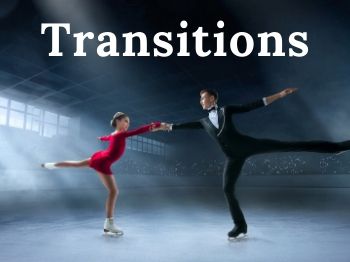
The skating skills and transitions are reasonably objective in terms of the way that they judged. In the skating skills, judges are looking for speed over the ice and power that seems effortless and depth of edges. The transitions are just that. The transitions between elements, the foot work, the ease at which they appear, the level of difficulty, variety and amount.
Performance, composition and interpretation
The performance is judged on the unison, the style that the program is skated in, the way that the skater carries them self.
The composition is about where the elements are skated on the ice, do they form a theme, are certain elements always skated in the same place. Does the program tell a story over the ice etc and the choreography in general.
The interpretation, is the interpretation of the music. This is the passion that is put into the performance, as well as how well the skating was performed to the music. Were elements skated in time with the music and were some of the nuances in the music demonstrated by the skater.
Figure skating is a sport that requires absolute athleticism and years of training

Figure skating is hard, make no mistake. The illusion is to make it look easy, but I assure you, that is an illusion.
Is figure skating a sport in terms of the fitness of its athletes?
If being a true athlete in terms of physical ability was ever an argument against figure skating not being a sport, that is fairly easy to dismiss. Figure skaters require fitness, strength, balance, flexibility and a state of mind to match. You rarely see all of these elements in any sport.
Fitness

Figure skaters are athletes. They are athletes competing in what is a very difficult sport. The levels of fitness required are incredible. Levels of cardio vascular fitness required to skate a long program at competition level are huge.
Strength

Then there is strength. Most of the time, a figure skater will be on one leg or another, over a bent knee, supporting all of their body weight. That’s not to mention the immense strength it takes to take off and land from a jump, even a single jump. Many figure skaters are jumping double, triple and even quadruple spins in jumps.
When thinking about pair skaters or ice dancers, they have to lift someones entire body weight, sometimes over their head. In the case of pair skaters, they also have to throw them.
Flexibility

Being a figure skater doesn’t directly make you flexible. You have to become flexible off ice to have the ability to perform on ice. Figure skaters spend hours in yoga and stretching routines to give them the flexibility to perform on ice.
Nutrition

Carbohydrates, protein, macro nutrients, vitamins, hydration. The list goes on. Many professional figure skaters are eating according to a nutritionist created diet. There nutrition follows the phases of their training. This is true of many sporting athletes.
Mental conditioning

The loss of performance under pressure can be felt by any athlete. This is magnified in figure skating where tiny mistakes result in point deductions and a slight error can cause a fall.
Grace

If all this is not enough, the greatest illusion about figure skating is yet to come. The grace and effortless power. It is one of the few sports where you are required to almost hide all of the hard work and preperation to make it look easy. Figure skaters are required to show grace and make it look like skating over ice with blades strapped to your feet is the most natural thing on earth.
Is figure skating a sport? The years of training on the run up to the Olympics says that it is
Many figure skaters days start at 4.30 am, off to the rink for an early patch ice session, then there is off ice training, fitness, flexibility, core strength etc. Then often back onto the ice, sometimes several times. Hydration, sleep and many more factors. This is for a normal training season for a figure skater.
It takes years of training at this level to compete at an international level. Thousands of hours on ice, many falls and a dedication that comes with a true passion for the sport.
I can only wonder what the preparation for the Olympics might be. Figure skating is a sport and the skaters are most definitely athletes.
Figure skaters retire young due to the extreme requirements of the sport
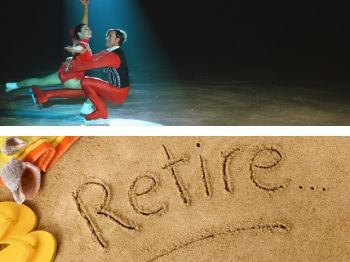
Figure skaters are athletes and figure skating is a sport. Like so many athletes that are competing at the highest level, its a young persons game. Figure skaters usually retire in their late twenties to early thirties. There are a few skaters that have skated later, but not many.
Of course figure skating that is not being performed at such a high level can go on for years to come. There are international ice skating competitions where adult skaters are still competing into their 60’s – 70’s and older.
Is figure skating a sport that is becoming too sporty?
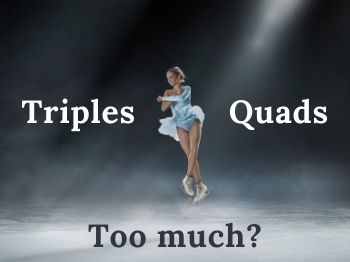
There are people out there that would argue that figure skating is not a sport because of the subjectivity of part of the scoring. As you may have realised by now, I definitely think it is a sport. But is it becoming too sporty, too focused on points?
With the advent of the quad jump, it seems that the person that perfoms the most quads is the winner. There have been several former international skaters saying that the sport has lost some of its elegance in race to win points.
Critics have complained about arms flailing around and the loss of grace in the name of technical point scoring. So the argument for the future may be, not whether figure skating is a sport, which it undoubtedly is, but how can we encourage the art form before it is lost to points.
Even ice dance is becoming points orientated
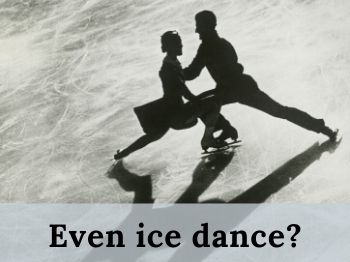
Ice dance has always been the stick with which the rest of figure skating is beaten when it come to the sports ‘sporting’ nature. Ice dance of course is subject to technical scoring like the rest of figure skating, but the nature of the dance is artistic and so prone to more criticism from the objective ‘sport’ argument skeptics.
But in a world of high profile figure skaters, even ice dance seems to have succumb to some point scoring mindset.
Competitive skating has always been about points
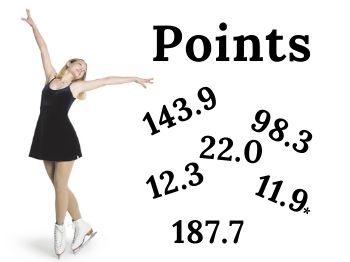
OK so skating in competition has always been about scoring points. If we wind the clock back 40 years, you still didn’t win if you didn’t get the points. That has always been the way.
The trouble is, not that the skaters are not athletes, part of the point of this article is to show that they are, in a professional sport. Rather that they are becoming super athletes, almost beyond the reach of normal people. Even ice dance is guilty of the points scoring mindset.
You can almost see in some ice dance programs that the point scoring elements are packed in end to end, sometimes at the sacrifice of grace, beauty and the telling of a story.
Not all ice dance is like this
I am not going to mention any names, but there is beautiful ice dance being skated by some top level skaters at the moment that is truly beautiful and graceful. It seems that points can still be awarded for a technically difficult program that is beautiful and elegant. It seems that weaving the grace into a modern, very technical program is possible, but I suspect not easy.
Is figure skating a sport through all of its types?
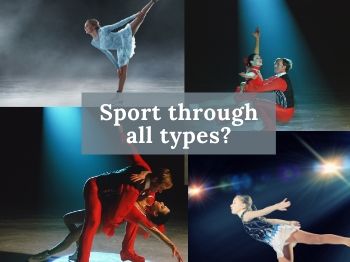
There are four types of figure skating, single, pair skating, ice dance and synchro. Can they all be judged as a sport when the disciplines are so different.
The answer is yeas, because they all carry a common theme. They are all judged primarily objectively in a quantifiable way through the Grade of Execution. Yes some points are awarded for artistic merit through the Program Component Score, but you wouldn’t get far with all the artistry in the world if your technical elements were poor.
Each of the figure skating disciplines deserves the status of a ‘sport’. Here is why.
Figure skating is a sport for single skaters
The jumps, the sheer pressure on technical point scoring. You would see this level of requirement with hard and fast rules in any Olympic sport. The athleticism, the sheer level of physical training that that it takes to do a quad jump makes single skating a sport in its own right.
Pair skating as a sport
I could just write here ‘see above’ as many of the requirements are the same, with the added difficulty of synchronicity and assisted jumps that are awe inspiring in terms of height, difficulty and danger. Pair skating is a sport.
Ice dance as a sport
This is the one that has the ‘sport’ critics talking. Just because it has dance in the title, does not make it an art. Yes there is an artistic element to the scoring, but no different to the rest of figure skating.
The objective, quantifiable part of the the scoring, the Technical Element Score (TES) is as hard and fast as all other areas of figure skating. Ice dancers are driven to perform unbelievable lifts, spins, twizzles etc to try to capture these points. Ice dance is a sport.
Synchro Skating as a sport
Synchronized skating, or synchro as it is known comprises many of the elements of single skating, including jumps, spins, twizzles etc, but is done as a synchronized team. The demands on the skaters are similar to any other discipline of figure skating, with the added difficulty of complete synchronization.
It is scored in the same way as the rest of figure skating in terms of a Technical Element Score (TES) and a Program Component Score (PCS). This means that along with Subjective there is also objective quantifiable points awarded.
The current status of synchro skating not being in the Olympics is more about the logistics of synchro rather than its status as a sport.
When an application is made to have an event in the Olympics, three bodies have to accept the application. The country that is hosting the games, the governing body of the sport and the Olympic committee.
The applications in the past have been declined due to not having enough room for the athletes to stay in the Olympic village (a synchro team is between 8 and 20 people, normally around the higher end of that scale). There has also been rumors of having enough time and space on ice.
The 2022 Beijing Winter Olympic Games does look hopeful for synchro, but at the moment it is still unknown. Either way synchronized skating has a world championship, which it deserves. Synchronized skating is a sport.
Is figure skating a sport with its chequered past of controversial judging scandals

The scandal I am referring to of course was the 2002 Winter Olympics in Salt Lake City. The scandal was between two teams of pair skaters, the Russians and the Canadians. Without going into the scandal too deeply, there were allegations of corruption. The Russians won the gold, but after an investigation, the Canadians had their silver medals upgraded to gold.
As a result of the scandal, the judging system was overhauled and an entirely new system of points allocation was rolled out. This is the International Judging System (IJS) in which the Technical Element Score (TES) is allocated on a complex and fairer scale.
Some people will always hold on to the scandal and use it to attempt to prove that figure skating is not a sport as the judging is subjective and prone to corruption. Figure skating is however, not the only sport to have been involved in foul play scandals over the years. At some point, most sports have.
With the new judging system, points are more quantifiable than ever. There will always be critics when it comes to the artistic part of figure skating, but that goes with the territory whenever sport and art combine.
Summary
Figure skating is a sport and the figure skaters are true athletes. It just so happens that it is a sport with artistic elements. That is not the downfall of figure skating, that is the beauty of it.
Life is not purely objective, quantifiable. Some is subjective. As long as sport is carried out by humans, there will be a subjective element.
Figure skating is unusual as a sport, because the illusion of ease is woven into its fabric. In few other sports does a lifetimes worth of work be required to look so effortless. Figure skating is a sport, it is an art. It is the best of human nature played out on ice.
If you found this article interesting
You might also enjoy learning more about the technical scoring on figure skating with the article ‘What is GOE (Grade of Execution) in figure skating?’
The article covers,
- What is GOE (Grade of Execution)?
- How are GOE points awarded?
- How are points taken off you (reductions)?
And many more insights that will not only help you to understand figure skating scores, but may help you achieve better scores yourself in competition, as you know what the judges are looking for. To read the full article click here.
*Obertsdorf

